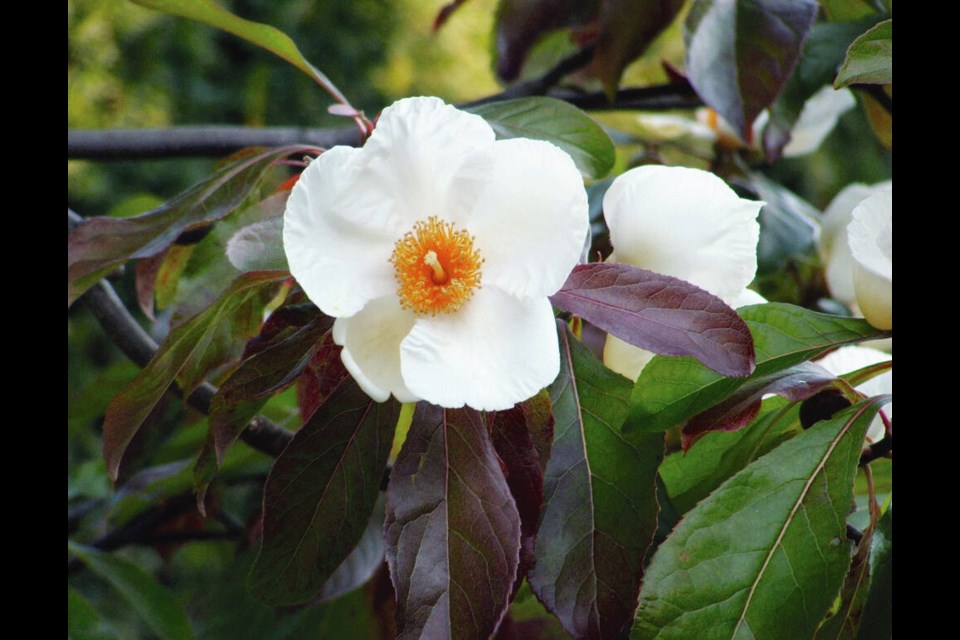Today, tales from the garden — with a little help from my friends.
Episode 1. Just over a month ago. I’m organizing covers for some of the stacked firewood when I hear the click of the front gate. It is Andrew, a keen gardener who lives a few blocks away. His parents were once fellow swimmers at a nearby beach as well as suppliers of walnuts from their trees. Andrew keeps in touch by dropping by occasionally.
This time, he bore gifts in the form of flowering Franklinia stems from a tree at the front of his garden. I was familiar with the name, but not with the plant — a tree that is considered fairly rare. Once native to Georgia in the United States, it is now extinct in the wild.
Franklinia is a small deciduous tree with glossy leaves and fragrant, camellia-like flowers from mid-summer to early fall. The tree requires full sun and a humus-rich, acidic soil. I was pleased to be introduced to a new plant.
Episode 2. First week in November. Mikaela is here to help me clear one of the vegetable plots. First, we harvest and share out our gleanings. A few last tomatoes remain, and Lemon cucumbers. These small, round heritage cucumbers continue producing far later in the season than the usual types.
On one of the lengths of wire there remain vines bearing plump, crisp and juicy snow peas. Another heirloom vegetable, this best of my fall snow peas is Japanese Climbing, from Salt Spring Seeds. We eat them, pull down the vines for compost and roll up the wire.
From another wire support we harvest dried Lady Di runner bean pods, which I shell later for the dried beans. Two overgrown zucchinis are cut from their vines and brought to the carport. Cooked with garlic and onion, they’ll be puréed for winter soups.
The plot cleared, we use leaves from a nearby alder tree and the bright red leaves fallen from an Oxydendrum (sorrel) tree to cover over the emptied soil.
That evening, I use the gathered tomatoes to make a sauce with garlic, onion and oregano for a spaghetti dinner.
Episode 3. Later the same week. Before heavy rain cuts short our cleanup of a messy corner, Laurel discovers a “raccoon latrine.” The animals have used a sheltered spot between forked roots of an old flowering cherry tree to make their deposits.
Knowing the potential dangers lurking in the feces, I warned Laurel away and went to the garden shed for newspaper and a shovel. I laid multiple layers of the paper down beside the latrine and carefully lifted the material onto the paper, which I folded up into a secure bundle before inserting it into a plastic bag. Into the garbage it went.
If the weather had been warm and dry, I’d also have put a mask on before the clean-up, as a protection against the possibility of inhaling tiny roundworm eggs that are often in raccoon feces.
GARDEN EVENT
Abkhazi sales and festive tea. Both garden and teahouse at Akhazi Garden, 1964 Fairfield Rd. in Victoria, are open from 11 a.m. to 4 p.m., Wednesday to Sunday. Last entrance to the garden is at 3:30 p.m. and the last reservation for the teahouse is at 3:30 p.m. Abkhazi Garden is now selling holiday and culinary wreaths and table centres. New this year are the Abkhazi Garden Teacup and Wreath Birdfeeders. All proceeds from these sales will be used to maintain the garden and preserve the legacy of Peggy and Nicolas Abkhazi. The teahouse is offering a Festive Christmas High Tea along with their delectable afternoon teas. Please make reservations at 778-265-6466 to avoid disappointment. The Gift Shop, located in the teahouse, features quality local artisan art, pottery, fabrics, jewelry, stationery and soaps. conservancy.bc.ca
Evolving Gardens. The Master Gardeners Association of B.C. will be presenting a “Mixing It Up” conference Saturday, Jan. 21, from 9 a.m. to 4:30 p.m. in the Mary Winspear Centre in Sidney. The day’s theme is Evolving Gardens. Five local speakers will address the challenges of climate change with a focus on resilient plants, “foodscaping” the home environment, understanding soil, and more. Details and registration at mixingitup.org. Up to Nov. 30 the cost is $80. After that, it is $100.



